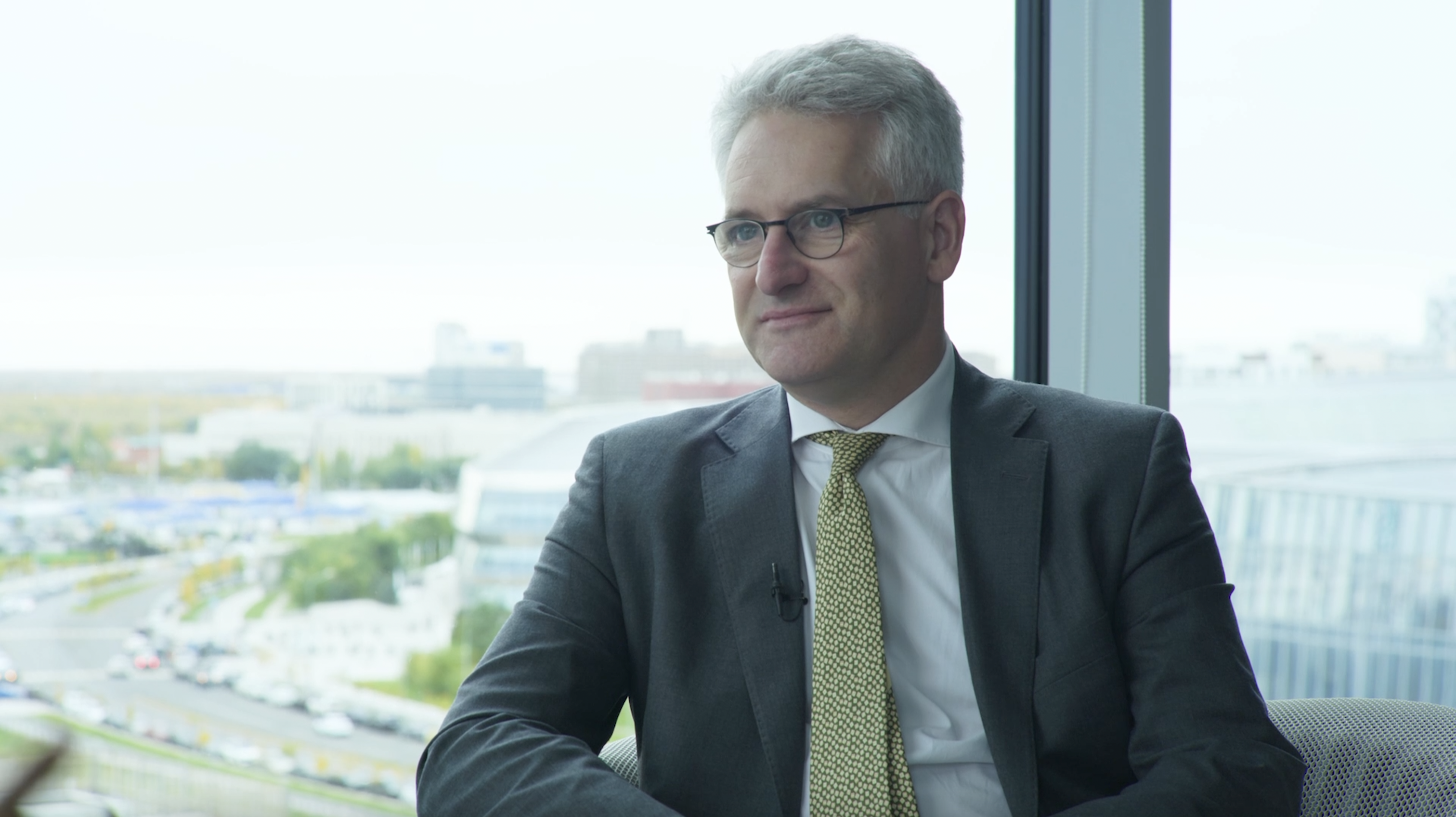ASTANA – Kazakhstan is adopting a more proactive approach in presenting itself to international markets, with increased outreach efforts, including toward the United States, the Middle East, and Asia, said Nicholas Page, a member of the board and an independent director at the Qazaqstan Investment Corporation (QIC), in a recent interview with The Astana Times.

Nicholas Page, a member of the board and an independent director at the Qazaqstan Investment Corporation (QIC). Photo credit: The Astana Times
“It is very evident that we are starting to see many more business visitors from the Middle East and Asia,” said Page, whose experience with Kazakhstan began in 2012. In his previous role, he was involved in a series of bank restructuring activities.
What is QIC?
Founded in 2007, QIC is a “fund of private equity funds” to promote the growth and development of the national economy of Kazakhstan. The primary goal of QIC is to bring in both local and international investors to finance projects in non-resource sectors of the economy jointly. The corporation provides financing through its private equity funds. Currently, it is involved in 17 private equity funds, with a combined total capitalization of $2.8 billion.
Page explained that QIC focuses on mobilizing capital for Kazakhstan’s real economy.
“What we are trying to do is mobilize capital so that it can be invested in the real economy in a complementary manner to how the government is investing in big industries and how the private sector is investing,” he said.
He stressed the specific role of private equity as a strategic investment tool.

The Astana Times journalist Assel Satubaldina and Nicholas Page during an interview. Photo credit: The Astana Times
“We place money with international investors who, in turn, invest back in Kazakhstan while also deploying capital into investment firms that we control. That money is then invested into businesses here in Kazakhstan,” he said.
Page noted that QIC invests either directly or through funds in equity, fixed income, or debt instruments to support local businesses in the real economy.
According to him, private equity development is at a lower level than that of developed economies, which underscores QIC’s mission. “One of the reasons why QIC exists is because we want to promote the growth of this private equity mechanism so that the private sector can expand alongside us so that we are not even needed eventually. But that is a long way down the road,” he said.
Regarding specific industries where QIC invests, Page said they monitor the market for business opportunities that align with Kazakhstan’s broader economic goals.
“We are trying to identify areas of the economy that need further investment,” he noted, highlighting the government’s goal to diversify the economy and make it greener, with a carbon neutrality target by 2060.
However, Page said to achieve those objectives, Kazakhstan needs strong collaboration between the government and industries. “It is not just the government doing everything; industry has to do some things for itself as well,” he said.
“We have invested in an airport, logistics, food processing, renewable energy, healthcare, and technology,” he explained, noting that QIC targets sectors where businesses have strong plans and promising growth potential. “We are investing in many different areas of the economy where we see there are businesses and managers with good business plans, propositions that deserve support and can deliver growth.”
Favorable investment landscape
Page highlighted that foreign investors prioritize political stability, a predictable legal system, and a straightforward tax framework when evaluating potential markets.
“All foreign investors want any marketplace to be as easy as possible. They have this little wish list of political stability, a predictable legal system, and an easy-to-understand tax system,” said Page.
Kazakhstan, according to him, is progressing in these areas. “It is very clear that Kazakhstan is moving in the right direction,” he said.
Page described Kazakhstan’s investment landscape as favorable, citing its investment-grade international credit rating and low debt-to-GDP ratio. He also pointed to Kazakhstan’s advantages, including its rich reserves of minerals, oil, and gas and significant opportunities in agriculture and technology.
“There is an opportunity to invest in those industries so that they can become a stronger export industry. Kazakhstan also has fantastic agricultural opportunities. With places like Astana Hub [international technopark of IT startups], you are investing very actively in technology industries,” he said.
Page noted that while significant progress has been made, more work remains, especially in light of recent challenges such as the Covid-19 pandemic, political disruptions, and the war between Russia and Ukraine, which have impacted investor sentiment globally.
In terms of the latter, Page said there are two sides of the coin.
“On the one hand, it creates an opportunity for Kazakhstan, and in many respects, that is positive,” he said. “But the other side of this coin, of course, is that there are certain parts of the world where we might be a little bit more cautious. (…) At the moment, the market is likely to be more attractive to investors coming from the Middle East or Asia,” said Page.
You can watch the full interview on The Astana Times YouTube channel.
